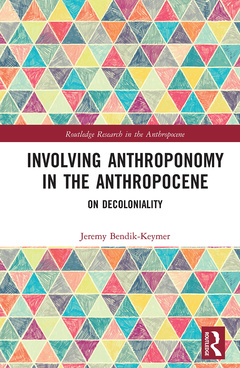Involving Anthroponomy in the Anthropocene On Decoloniality Routledge Research in the Anthropocene Series

This book introduces the idea of anthroponomy ? the organization of humankind to support autonomous life ? as a response to the problems of today?s purported "Anthropocene" age. It argues for a specific form of accountability for the redressing of planetary-scaled environmental problems.
The concept of anthroponomy helps confront geopolitical history shaped by the social processes of capitalism, colonialism, and industrialism, which have resulted in our planetary situation. Involving Anthroponomy in the Anthropocene:On Decoloniality explores how mobilizing our engagement with the politics of our planetary situation can come from moral relations. This book focuses on the anti-imperial work of addressing unfinished decolonization, and hence involves the "decolonial" work of cracking open the common sense of the world that supports ongoing colonization. "Coloniality" is the name for this common sense, and the discourse of the "Anthropocene" supports it. A consistent anti-imperial and anti-capitalist politics, one committed to equality and autonomy, will problematize the Anthropocene through decoloniality. Sometimes the way forward is the way backward.
Written in a novel style that demonstrates ? not simply theorizes ? moral relatedness, this book makes a valuable contribution to the fields of Anthropocene studies, environmental studies, decolonial studies, and social philosophy.
The Open Access version of this book, available at http://www.taylorfrancis.com, has been made available under a Creative Commons Attribution- NonCommercial-ShareAlike (CC-BY-NC-SA)
Acknowledgements; Preface: on the essay form; 1. How should I engage in community politics?; 2. How should I relate to colonialism?; 3. How should I understand my responsibility and show it?; 4. How should I respond to the "Anthropocene"?; 5. How should I involve anthroponomy in the course and prospect of my life?; 6. What could others make of anthroponomy and how can I support them?; In Belle Valley; On the Farm: Julia D. Gibson; Glossary; Index
Jeremy Bendik-Keymer holds the Beamer-Schneider Professorship in Ethics at Case Western Reserve University. He authored The Ecological Life and two works in literary philosophy, Solar Calendar, and Other Ways of Marking Time and The Wind. He co-edited Ethical Adaptation to Climate Change.
Date de parution : 12-2021
15.6x23.4 cm
Date de parution : 05-2020
15.6x23.4 cm
Mots-clés :
the anthropocene; environmental geography; environmental ethics; environmental politics; environmental agency; collective responsibility; environmental philosophy; anthroponomy; decolonization; mass extinction; climate change; environment and economy; Planetary Situation; Cleve Land; Shaker Heights; Settler Colonial Domination; Coercive Inequality; Chief Wahoo; Clear Deformation; Time’s Reach; Petro Chemical Industry; Decolonial Work; Moral Accountability; Broken Words; Spiral Time; Morally Considerable; Land Logic; Autonomous Disagreement; Prospective Responsibility; Colonial World System; Columbus Day Parade; Land Reclamation; Woodlawn Avenue; Planetary Scales; Planetary Dimensions; Planetary Reaches



